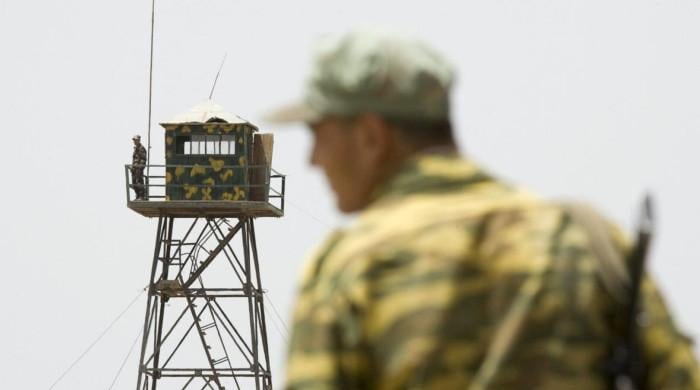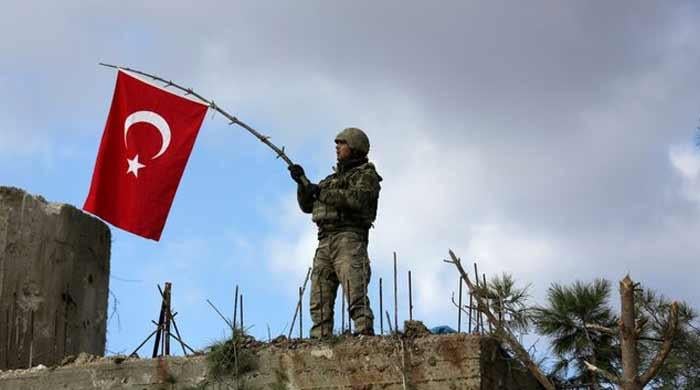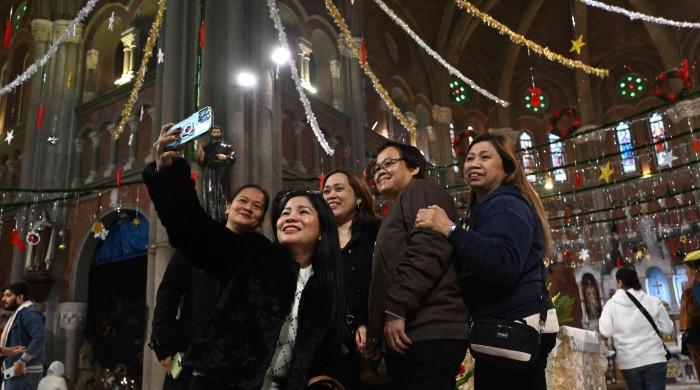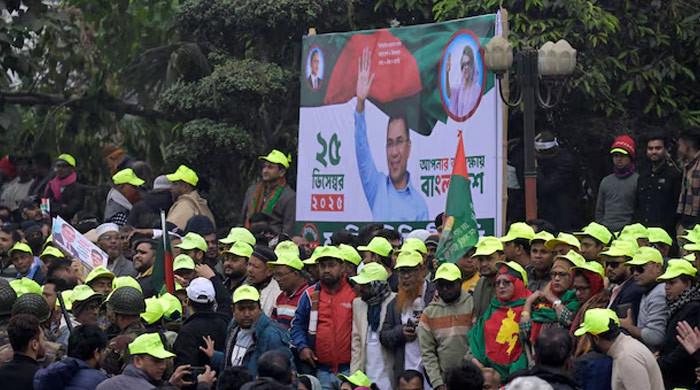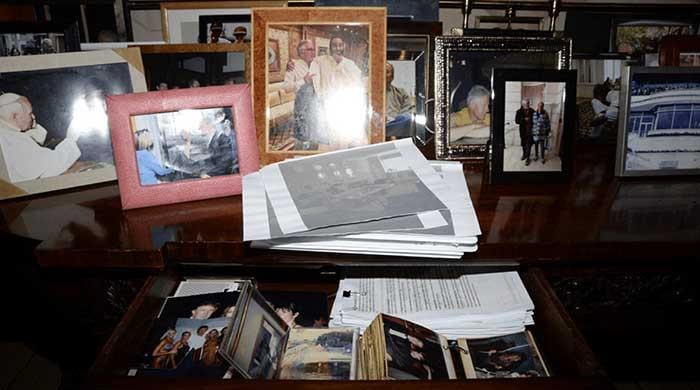Nobel Prize-winning anti-apartheid hero Desmond Tutu dies aged 90
PM Imran Khan says "his critical role in liberation and national reconciliation are an inspiration for future generations"
December 26, 2021
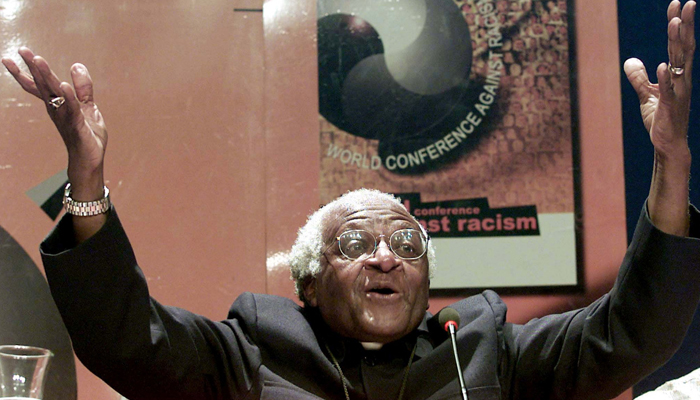
- Tutu won Nobel for non-violent opposition to apartheid
- Tutu considered nation's conscience by both Black and white
- Anti-apartheid hero fought for "Rainbow Nation"
- State gives no details on the cause of death
- Tutu diagnosed with cancer in 1990s
JOHANNESBURG: Archbishop Desmond Tutu, Nobel Peace Prize laureate and veteran of South Africa's struggle against white minority rule, died on Sunday at the age of 90.
In 1984, Tutu won the Nobel Peace Prize for his non-violent opposition to apartheid. A decade later, he witnessed the end of that regime and chaired a Truth and Reconciliation Commission, set up to unearth atrocities committed during those dark days.
The outspoken Tutu was considered the nation's conscience by both Black and white, an enduring testament to his faith and spirit of reconciliation in a divided nation.
He was diagnosed with prostate cancer in the late 1990s and in recent years was hospitalised on several occasions to treat infections associated with his cancer treatment.
"The passing of Archbishop Emeritus Desmond Tutu is another chapter of bereavement in our nation’s farewell to a generation of outstanding South Africans who have bequeathed us a liberated South Africa," President Cyril Ramaphosa said.
"Desmond Tutu was a patriot without equal."
The presidency gave no details on the cause of death.
Tutu preached against the tyranny of the white minority but his fight for a fairer South Africa never ended, calling the Black political elite to account with as much feistiness as he had the white Afrikaners.
In his final years, he regretted that his dream of a "Rainbow Nation" had yet to come true.
"Ultimately, at the age of 90, he died peacefully at the Oasis Frail Care Centre in Cape Town this morning," Dr Ramphela Mamphele, acting chairperson of the Archbishop Desmond Tutu IP Trust and Co-ordinator of the Office of the Archbishop, said in a statement on behalf of the Tutu family.
A frail-looking Tutu was seen in October being wheeled into his former parish at St George's Cathedral in Cape Town, which used to be a safe haven for anti-apartheid activists, for a service marking his 90th birthday.
Dubbed "the moral compass of the nation", his courage in defending social justice, even at great cost to himself, always shone through. He often fell out with his erstwhile allies at the ruling African National Congress party over their failures to address the poverty and inequalities that they promised to eradicate.
Tutu, just five feet five inches (1.68 metres) tall and with an infectious giggle, travelled tirelessly throughout the 1980s, becoming the face of the anti-apartheid movement abroad while many of the leaders of the rebel ANC such as Nelson Mandela were behind bars.
Although he was born near Johannesburg, he spent most of his later life in Cape Town and led numerous marches and campaigns to end apartheid from St George's front steps, which became known as the "People's Cathedral" and a powerful symbol of democracy. Known for punchy quotes, Tutu once said: "I wish I could shut up, but I can't, and I won't".
'Inspiration for future generations'
Having officially retired from public life on his 79th birthday, Tutu continued to speak out on a range of moral issues, including accusing the West in 2008 of complicity in Palestinian suffering by remaining silent.
In 2013, he declared his support for gay rights, saying he would never "worship a God who is homophobic".
Tributes poured in from around the world for the man fondly known as "The Arch".
Prime Minister Imran Khan extended his "deepest condolences" on his passing, noting that he was a "close confidante of Nelson Mandela, an icon of anti-apartheid struggle and champion of human rights".
"His critical role in liberation and national reconciliation are an inspiration for future generations," he added.
The Archbishop of Canterbury Justin Welby hailed Tutu as a "a prophet and priest" while Pope Francis offered heartfelt condolences to his family and loved ones.
Former US President Barack Obama said Tutu was a "mentor, a friend, and a moral compass" who "never lost his impish sense of humour and willingness to find humanity in his adversaries".
UK Prime Minister Boris Johnson noted Tutu's "critical" role in the "struggle to create a new South Africa", while his deputy Dominic Raab said Tutu's adage of 'Don’t raise your voice, improve your argument' had "never felt more apt".
Norway's Prime Minister Jonas Gahr Stoere recalled "a great little man who showed the power of reconciliation and forgiveness".
"We are better because he was here," Bernice King, daughter of Martin Luther King, said.
In a letter to Tutu's daughter Reverend Mpho Tutu, Tibet's spiritual leader the Dalai Lama said the world had "lost a great man, who lived a truly meaningful life".
Tutu and his long-time friend Mandela lived for a time on the same street in the South African township of Soweto, making Vilakazi Street the only one in the world to host two Nobel Peace Prize winners.
"His most characteristic quality is his readiness to take unpopular positions without fear," Mandela once said of Tutu. "Such independence of mind is vital to a thriving democracy."
At a Boxing Day service at St George’s, the Very Reverend Michael Weeder paid homage to Tutu from the Archbishop's former pulpit, saying it was “once the celebrated point of command” before asking the handful of parishioners present to bow their heads in a moment of silence.




